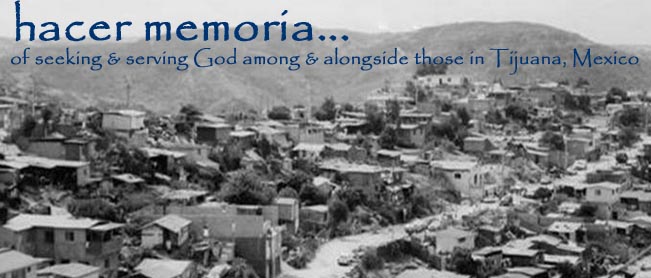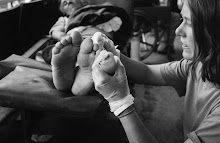- Pronounciacion and Grammer, taught by 5 year-old Israel, along with a variety of other contributors. He is the strictest teacher that I have, by far. No error in pronounciacion or grammer, however small, escapes his ears. He insists that I repeat words syllable by syllable until I have it exactly right. And if I had a peso for every time that I heard him say "No Magi, you don't say it like that...you say it like this..." I probably wouldn't need your generous financial support!
- Mexican "Dichos" (Sayings), taught mainly by Giovanni and Alberto. This is one of my more advanced classes, as it involves more that just understanding the words, but also the cultural meaning behind them. This class has helped me tremendously in advancing my conversational skills. Some of my most-incorporated sayings thus far include: El que mucho abarca, poco aprieta (loosely translated: he who tries to do too much ends up not doing anything well), Vive con Andrés un mes y verás quien es ("live with Andres for a month and you'll see who he really is"), and Cuando Dios dice "a comer," hasta del cielo llueven chicharrones (literally "when God says 'time to eat,' pork rinds will rain down even from heaven"...which is equal, more or less, to the "where God guides, He provides").
- Films and Readings, which incorporates mainly old black-and-white comedies such as Capulina and Cantinflas, as well as a variety of childrens' books. The films portion has served both to build up my Spanish vocabulary, as well as increase my knowledge of Mexican history and culture. Israel can often be found quoting and/or acting out various parts of aforementioned films, supplementing this learning experience. Reading the childrens' books aloud both contributes greatly to both my vocabulary as well as complementing the lessons learned in my Pronounciacion class (especially if I'm reading to Israel!).
- Spanish Swear Words (aka, What One Should NOT Say), taught by Pelayo while I did his wound care. I'm actually no longer enrolled in this particular class, as we came to the point where he no longer screamed swear words at me for a half-hour straight. But, the repetition served me well and while he never provided the direct translations, I certainly came away with the general understanding of what NOT to say.
- Tijuanese/Mexican Slang, taught through a cooperative effort of many of my friends here. This is where I've learned la neta que (the truth is that) my past formal language study actually taught me the wrong way to communicate many things if I want to have any real credibility here!
Wednesday, April 21, 2010
language school
At the LAM Mexico retreat last month, I was asked several times by other missionaries whether I'd gone to language school. The answer was no, I came straight to Tijuana without passing through a formal language school. Upon further reflection, however, I'd like to ammend my answer: I'm currently enrolled in at least 5 language "classes." Take a look at my course catalouge...
"...normal language acquisition is a social activity, not an academic activity. The isolation of the foreigner in a language school does little to communicate positively in the community" (Language Learning IS Communication IS Ministry! by Thomas & Elizabeth Brewster)
"Indeed, if we do no more than engage in the process of language learning we will have communicated more of the essentials of the Gospel than if we devote ourselves to any other task I can think of" (Charles H. Kraft, missionary anthropologist).
Subscribe to:
Post Comments (Atom)








1 comment:
That's great! It's true, I have learned a lot of tiquismos "(Costa Rican-isms) while I've been here, though there are still a lot I don't know. And it is so nice to have people who are willing to cirrect and help me! The quotes from the Brewsters and Kraft were great! Have you taken the Perspectives class? it is SO good And I've read articles by both of them in it. Always a pleasure to read your blog! Besos!
Post a Comment